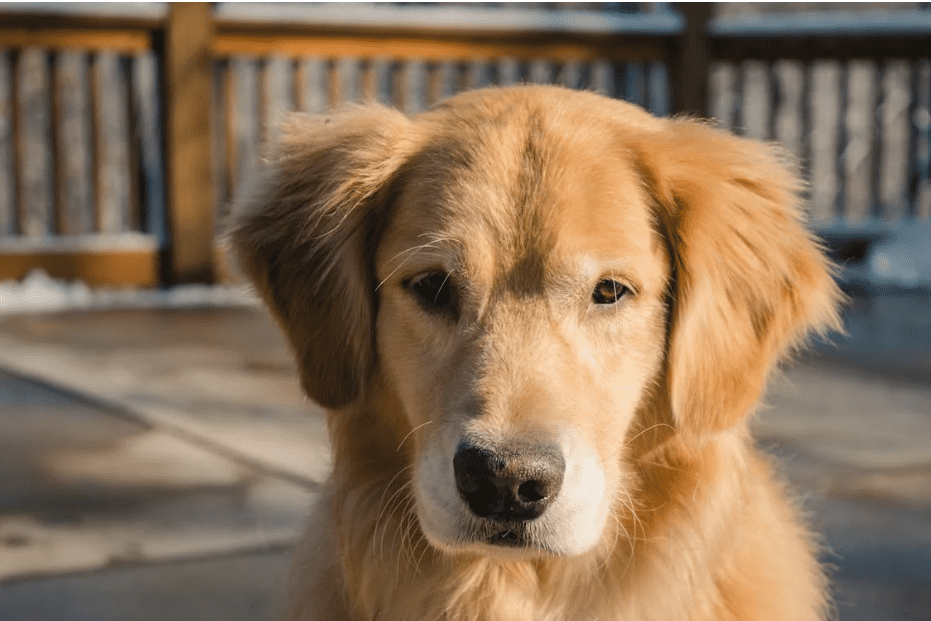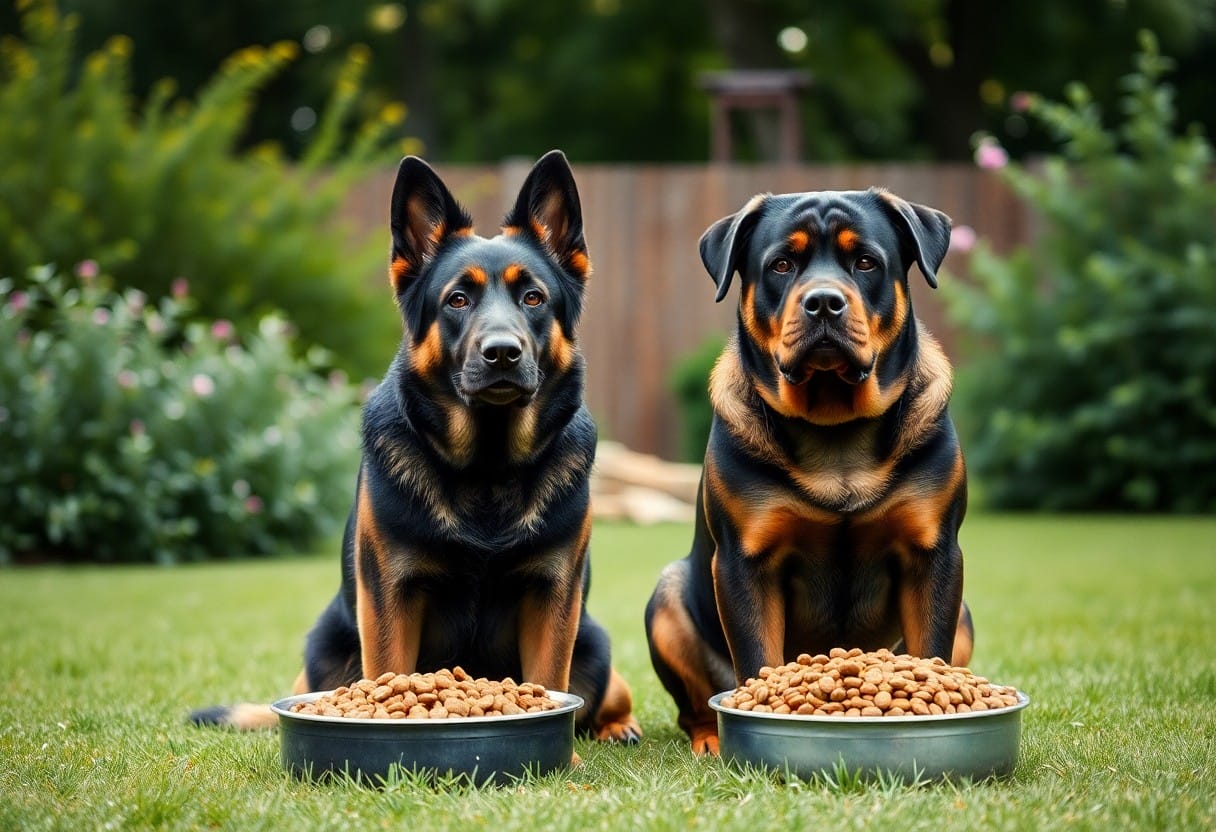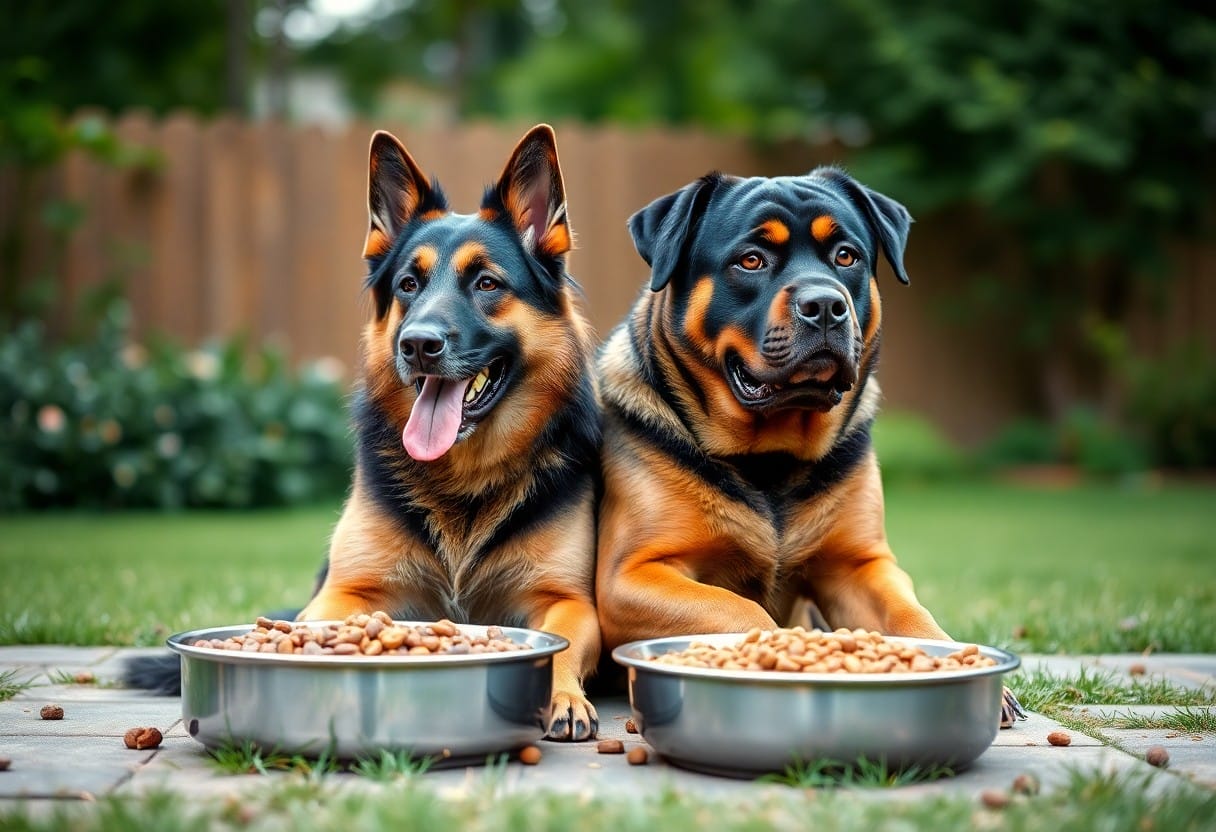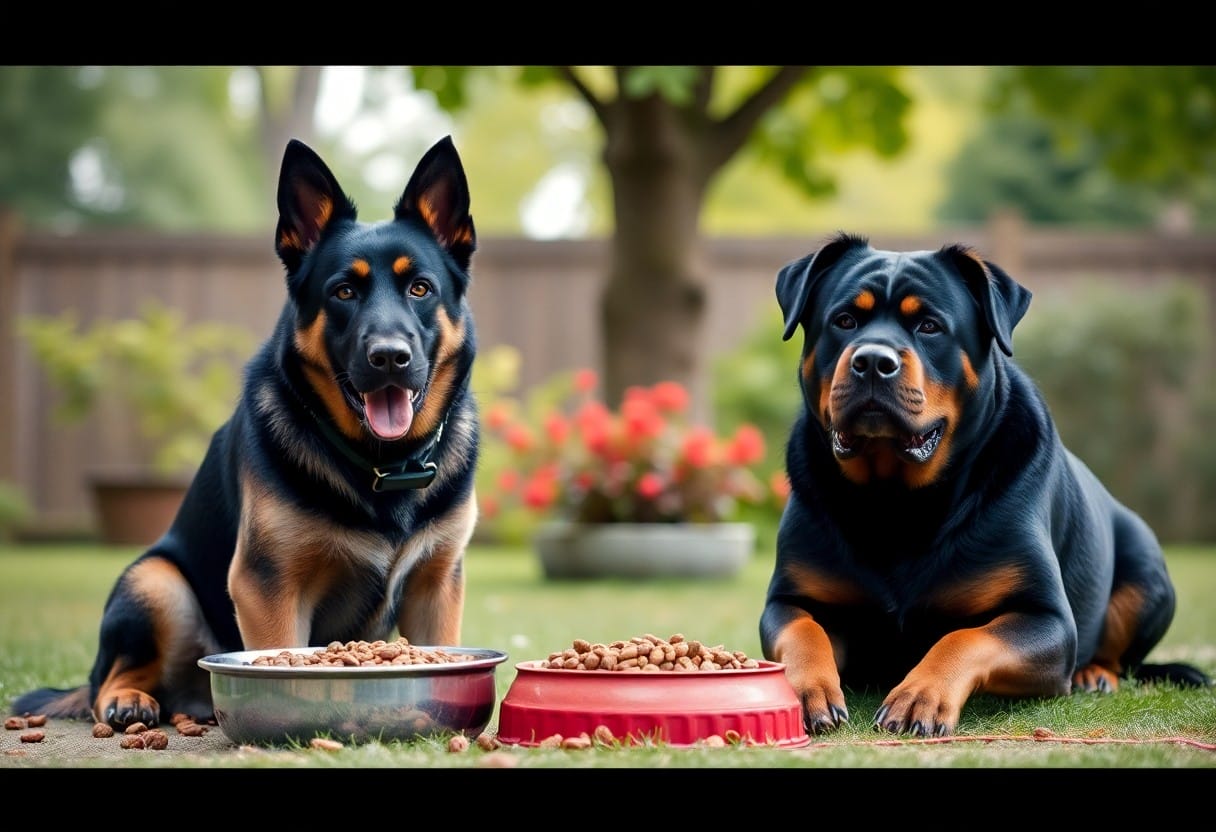
Large Breeds, Big Appetites - Diet Tips for German Shepherds and Rottweilers
Share
There's no denying that German Shepherds and Rottweilers are magnificent large breeds with equally large appetites. As a responsible owner, it's important to provide a diet that not only caters to their nutritional needs but also helps maintain their optimal weight and overall health. In this post, you will discover vital tips on how to balance their meals, understand portion sizes, and choose the right ingredients that promote healthy growth while preventing common issues such as obesity and joint problems.
Key Takeaways:
- Balanced Diet: Ensure your German Shepherd or Rottweiler receives a well-rounded diet that includes adequate protein, fats, and crucial nutrients to support their large size and energy levels.
- Portion Control: Monitor portion sizes to prevent obesity, which can lead to various health issues, given the predisposition of these breeds to weight gain.
- Regular Feeding Schedule: Establish a consistent feeding routine to help manage hunger levels and promote digestion, ideally providing meals twice a day for optimal health.

Understanding the Nutritional Needs of Large Breeds
While German Shepherds and Rottweilers are known for their strength and athleticism, their nutritional needs are often misunderstood. Large breeds have unique requirements that differ significantly from those of smaller dogs. These needs stem not only from their size but also from their rapid growth patterns during puppyhood and the maintenance of their overall health as adults. Providing a well-balanced diet tailored to your dog's specific requirements is vital to ensure proper growth and longevity.
Key Nutrients for Growth and Maintenance
Any responsible owner should prioritize a diet rich in protein, as it plays a fundamental role in building and maintaining muscle mass. For large breeds like German Shepherds and Rottweilers, it's advisable to select protein sources from high-quality animal proteins such as chicken, beef, or fish. Additionally, incorporating a healthy balance of fats is vital for delivering energy and promoting healthy skin and coat. Moreover, don't overlook the importance of carbohydrates and fiber, as they aid in digestion and help maintain optimal energy levels throughout your dog's day.
Caloric Requirements Based on Activity Levels
Across the board, understanding the caloric needs of your large breed dog is vital to prevent obesity and promote overall health. Your dog's activity level, age, and metabolism all influence how many calories they need. For instance, a highly active German Shepherd engaged in regular training or play may require significantly more calories than a Rottweiler who leads a more sedentary lifestyle. Always consult the recommended feeding guidelines from the dog food manufacturer, but be prepared to adjust their intake based on their activity and health needs.
Even subtle changes in your dog's routine can impact their caloric needs significantly. For large breeds, an appropriate diet that matches their activity levels can help prevent weight-related issues such as joint problems or heart disease. Therefore, it's critical to monitor your dog's weight and adjust their food intake accordingly. Prioritizing a nutritional plan tailored to your dog's lifestyle not only ensures their energy requirements are met but also helps maintain their vitality, leading to a happier and healthier life.
Choosing the Right Dog Food
Some dog owners may feel overwhelmed by the range of nutrition options available for their large breed pets, such as German Shepherds and Rottweilers. It's important to find a diet that meets their specific needs and provides them with optimal health. Both commercial diets and homemade meals have their advantages and drawbacks, so choosing the right one can significantly impact your dog's well-being.
Commercial vs. Homemade Diets
For busy pet owners, commercial dog food often provides a convenient and balanced option. Reputable brands formulate their products to meet the nutritional requirements of large breeds, ensuring a proper balance of protein, carbohydrates, fats, and imperative vitamins. However, you must be vigilant in selecting high-quality brands, as not all commercial options are created equal. On the other hand, a homemade diet can offer you more control over the ingredients and the ability to cater to specific dietary needs or allergies your dog may have. Yet, creating a balanced homemade diet can be challenging and requires thorough research and potentially consulting with a veterinarian to ensure it meets all nutritional needs.
Reading and Understanding Labels
Above all, when selecting any pet food, it's vital to carefully read and understand the labels. Look for meat as the first ingredient, which indicates a higher protein content, and ensure it features whole grains and vegetables as secondary ingredients. Avoid products with vague terms like "meat by-products" or artificial preservatives and fillers. Being informed about the ingredients can help you choose a food that enhances your dog's health rather than detracts from it.
Choosing the right dog food for your German Shepherd or Rottweiler involves understanding what goes into their meals. Focus on high-quality protein sources, and ensure you check for specific fat and fiber content tailored for large breeds, as this can prevent obesity and promote joint health. Always look for products that have gone through feeding trials, as these are scientifically proven to be nutritious and beneficial for your dog. You'll feel more confident in your choice when you know how to interpret the labels and select a diet that will support a long and healthy life for your beloved pet.

Portion Control and Feeding Schedules
Determining Proper Portion Sizes
Above all, understanding how to determine proper portion sizes for your German Shepherd or Rottweiler is imperative to their health. These large breeds have specific nutritional requirements based on their weight, age, activity level, and overall health. To find the right amount, refer to the feeding guidelines provided on your dog food packaging and adjust according to your dog's individual needs. If you're uncertain, consulting with your veterinarian can provide valuable insight tailored to your dog's specific requirements and help prevent issues such as obesity.
Labradors require a diet that matches their energy levels and supports their overall health—find practical feeding tips in this blog on Feeding a Labrador: Diet Tips for This Active Breed.
Establishing a Consistent Feeding Routine
Beside portion sizes, establishing a consistent feeding routine plays a vital role in managing your dog's appetite and digestive health. Dogs thrive on routine, and having set meal times can help regulate their metabolism. Aim to feed your large breed dog two meals a day, spaced about 12 hours apart. This practice not only helps maintain your dog's energy levels throughout the day but also reduces the chances of overeating, which can lead to serious health problems.
Also, a consistent feeding routine can lead to better behavioral habits. Dogs who have a structured schedule are less likely to beg for food or engage in destructive behaviors out of hunger. Additionally, monitor your dog's weight regularly to make adjustments as necessary and ensure that they are not gaining excess weight, as this can cause stress on their joints and overall health. Overall, a stable routine contributes positively to your dog's lifestyle and can enhance their well-being.

Common Dietary Issues in German Shepherds and Rottweilers
Now, understanding the dietary issues that may arise for large breeds like German Shepherds and Rottweilers can help you optimize their health and well-being. Issues such as food allergies and sensitivities are not uncommon in these breeds, and since they have distinct dietary needs.
This guide can assist you in identifying common allergens and provide insights into selecting ingredients that are less likely to trigger adverse reactions in your dog.
Food Allergies and Sensitivities
About 10% of dogs suffer from food allergies, and large breeds like German Shepherds and Rottweilers may be predisposed to certain ingredients. Symptoms can range from skin irritations and itching to gastrointestinal upset, such as vomiting or diarrhea. You should monitor your dog for any signs of discomfort following mealtimes, as a reaction could indicate that the food you are offering contains an ingredient they're sensitive to. If you suspect an allergy, it may be wise to consider a limited ingredient diet that excludes common offenders like beef, chicken, or wheat.
Weight Management and Obesity Prevention
One of the more serious concerns for large breeds is the risk of obesity, which can lead to several health issues, including joint problems and metabolic disorders. As a responsible pet owner, you need to be proactive in managing your dog's weight to ensure they lead a healthy life. Regular exercise combined with appropriate portion sizes is vital to keep your German Shepherd or Rottweiler in shape. Monitor their weight through regular veterinary check-ups and consider adjusting their diet as they age or if their activity level changes.
Choosing the right health tests for your dog is crucial for their well-being—explore the top options and their benefits in this blog on What Is the Best Health Test for Dogs?
Food plays a significant role in weight management, and it's necessary to offer a balanced diet designed for large breeds. Focus on high-quality protein sources and incorporate healthy fats while avoiding calorie-dense treats that can contribute to weight gain. Keeping a close eye on your dog's body condition and making necessary adjustments to their feeding regimen can significantly reduce their likelihood of developing obesity-related health problems.
Supplements and Special Considerations
Unlike smaller breeds that may have fewer nutritional complexities, large breeds like German Shepherds and Rottweilers often need tailored diets that can accommodate their distinct health requirements. Supplementation can play a significant role in ensuring your dog's overall health and wellness. Essential nutrients such as Omega-3 fatty acids, glucosamine, and chondroitin can improve joint health while promoting a shiny coat and a healthy immune system.
Joint Health and Age-Related Needs
Along with a balanced diet, it's vital to consider the specific needs of your dog, especially as they age. Large breeds are more prone to joint issues, including hip and elbow dysplasia, so including supplements like glucosamine can help to maintain their mobility as they grow older. Additionally, pay attention to their weight management, as excess weight can place extra strain on their joints. A veterinarian can help you outline an effective plan that may include both weight control and appropriate supplements tailored to your dog's lifestyle and age.
When to Consult a Veterinarian
Special care should be taken when it comes to your dog's health. If you notice any signs of discomfort, such as limping, difficulty standing, or unusual behavior, it's important to consult a veterinarian for a thorough evaluation. Addressing these issues early can prevent more severe health problems down the road. Staying proactive with regular check-ups will help you catch any potential concerns before they escalate.
And if your dog exhibits significant changes in appetite, energy levels, or weight, do not hesitate to seek professional advice. Dogs that are lethargic, refuse food, or show signs of distress could be facing underlying health issues that require immediate attention. Taking these steps can help to ensure that your large breed companion lives a long, healthy, and fulfilling life.
Training and Behavioral Considerations related to Diet
After establishing a proper diet for your German Shepherd or Rottweiler, it's important to focus on training and behavioral aspects that relate to their eating habits. Understanding how diet can impact your dog's behavior is key to ensuring a balanced relationship between them and their food. A proper diet not only supports their health but also can aid in enhancing their training experience. Always be mindful of their unique needs as large breeds, as it may influence how they respond to commands and their overall behavior.
Using Treats Effectively in Training
With large breeds like German Shepherds and Rottweilers, using treats can be an effective motivation tool in training. However, it's important to be selective about the type and quantity of treats you use, as these dogs have a tendency to gain weight quickly. Opt for healthy, low-calorie treats that are appropriate for their size, and make sure to adjust their main meal accordingly to account for any extra calories from treats. This will help you maintain a healthy weight while still providing positive reinforcement during training.
Addressing Food Aggression and Resource Guarding
Resource guarding can often stem from a dog's instinct to protect their food and may manifest as >strong>food aggression. This behavior can be problematic, especially in large breeds, as it may pose a risk to household members and other pets. To address this, you must establish a consistent routine around mealtime. Avoid free-feeding and create a structured feeding schedule to make meals predictable. During feeding time, observe your dog's behavior, and if they exhibit signs of aggression, work with a professional trainer to implement suitable counter-conditioning strategies.
And to further mitigate issues related to food aggression, incorporate positive reinforcement techniques where you reward your dog for calm behavior around food. Start by allowing your dog to see or be near their food without them feeling threatened. Gradually introduce distractions, such as adding your presence or other pets while they eat, ensuring they associate your approach with positivity. This method not only diminishes aggressive tendencies but also reinforces a healthy relationship with food and reduces anxiety. Your approach should continually focus on creating a safe environment that encourages appropriate behavior around food, fostering trust and security in the long run.
Conclusion
Summing up, managing the diet of your large breed dogs such as German Shepherds and Rottweilers is important for their overall health and longevity. You must consider their specific nutritional needs, which are influenced by factors like age, activity level, and breed characteristics. Prioritizing high-quality proteins, balanced fats, and important vitamins and minerals will ensure that your dog receives the proper nourishment they require. Implementing portion control and monitoring your dog's weight will also help you avoid the common pitfalls associated with overfeeding large breeds.
Additionally, integrating healthy snacks and maintaining a regular feeding schedule can further enhance your dog's dietary routine. It's important to be mindful of any food allergies or sensitivities that may arise, as well as staying informed about the best feeding practices specific to large breeds. Ultimately, by taking these key steps, you can provide your German Shepherd or Rottweiler with the foundation they need for a happy, active, and healthy life.
Frequently Asked Questions
What should I consider when choosing a diet for my German Shepherd or Rottweiler?
A: When choosing a diet for your German Shepherd or Rottweiler, it's important to focus on their age, weight, activity level, and any specific health concerns. Large breeds often need a balanced diet rich in protein, healthy fats, and imperative nutrients to support their growth and maintain their muscle mass. Additionally, look for dog food that includes glucosamine and chondroitin to support joint health, and be mindful of calorie intake to prevent obesity.
How much should I feed my German Shepherd or Rottweiler daily?
A: The amount of food to feed your German Shepherd or Rottweiler depends on their age, weight, and activity level. Typically, adult large breeds require about 2 to 3 cups of high-quality dog food daily, divided into two meals to aid digestion. Puppies may require more frequent feeds and a specially formulated puppy food to support their rapid growth. Always consult your veterinarian to determine the most appropriate amount for your pet.
Are there specific ingredients I should look for in dog food for large breeds?
A: Yes, you should look for dog food that lists high-quality animal protein sources as the first ingredient, such as chicken, beef, or fish. Whole grains like brown rice and oats can provide necessary carbohydrates, while fruits and vegetables like sweet potatoes and carrots offer fiber and imperative vitamins. It's also beneficial to choose foods with added omega fatty acids for a healthy coat and skin, and antioxidants to support the immune system.
Should I be concerned about feeding large breeds too quickly?
A: Yes, feeding large breeds too quickly can lead to a serious condition known as bloat, or gastric torsion, which is life-threatening. To prevent this, consider using slow-feed bowls that encourage your dog to eat at a slower pace. Dividing their daily food into two or more smaller meals instead of one large meal can significantly reduce the risk. Keeping water separate and allowing cooling down time after exercise can also help.
Can I give treats to my German Shepherd or Rottweiler, and how should I choose them?
A: Treats are a great way to reward your German Shepherd or Rottweiler, but it's important to choose them wisely. Look for low-calorie options that complement their overall diet, such as single-ingredient meats, fruits, or vegetables. Treats should make up no more than 10% of your pet's daily caloric intake to prevent weight gain. Always check the ingredient labels to ensure they are healthy and free from harmful additives.
